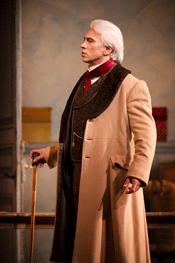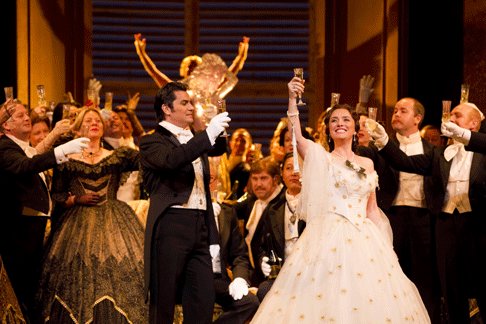Recently in Performances
English Touring Opera are delighted to announce a season of lyric monodramas to tour nationally from October to December. The season features music for solo singer and piano by Argento, Britten, Tippett and Shostakovich with a bold and inventive approach to making opera during social distancing.
This tenth of ten Live from London concerts was in fact a recorded live performance from California. It was no less enjoyable for that, and it was also uplifting to learn that this wasn’t in fact the ‘last’ LfL event that we will be able to enjoy, courtesy of VOCES8 and their fellow vocal ensembles (more below …).
Ever since Wigmore Hall announced their superb series of autumn concerts, all streamed live and available free of charge, I’d been looking forward to this song recital by Ian Bostridge and Imogen Cooper.
Although Stile Antico’s programme article for their Live from London recital introduced their selection from the many treasures of the English Renaissance in the context of the theological debates and upheavals of the Tudor and Elizabethan years, their performance was more evocative of private chamber music than of public liturgy.
Evidently, face masks don’t stifle appreciative “Bravo!”s. And, reducing audience numbers doesn’t lower the volume of such acclamations. For, the audience at Wigmore Hall gave soprano Elizabeth Llewellyn and pianist Simon Lepper a greatly deserved warm reception and hearty response following this lunchtime recital of late-Romantic song.
For this week’s Live from London vocal recital we moved from the home of VOCES8, St Anne and St Agnes in the City of London, to Kings Place, where The Sixteen - who have been associate artists at the venue for some time - presented a programme of music and words bound together by the theme of ‘reflection’.
'Such is your divine Disposation that both you excellently understand, and royally entertaine the Exercise of Musicke.’
‘And there was war in heaven: Michael and his angels fought against the dragon; and the dragon fought and his angels, And prevailed not; neither was their place found any more in heaven … that old serpent … Satan, which deceiveth the whole world: he was cast out into the earth, and his angels were cast out with him.’
There was never any doubt that the fifth of the twelve Met Stars Live in Concert broadcasts was going to be a palpably intense and vivid event, as well as a musically stunning and theatrically enervating experience.
‘Love’ was the theme for this Live from London performance by Apollo5. Given the complexity and diversity of that human emotion, and Apollo5’s reputation for versatility and diverse repertoire, ranging from Renaissance choral music to jazz, from contemporary classical works to popular song, it was no surprise that their programme spanned 500 years and several musical styles.
The Academy of St Martin in the Fields have titled their autumn series of eight concerts - which are taking place at 5pm and 7.30pm on two Saturdays each month at their home venue in Trafalgar Square, and being filmed for streaming the following Thursday - ‘re:connect’.
The London Symphony Orchestra opened their Autumn 2020 season with a homage to Oliver Knussen, who died at the age of 66 in July 2018. The programme traced a national musical lineage through the twentieth century, from Britten to Knussen, on to Mark-Anthony Turnage, and entwining the LSO and Rattle too.
With the Live from London digital vocal festival entering the second half of the series, the festival’s host, VOCES8, returned to their home at St Annes and St Agnes in the City of London to present a sequence of ‘Choral Dances’ - vocal music inspired by dance, embracing diverse genres from the Renaissance madrigal to swing jazz.
Just a few unison string wriggles from the opening of Mozart’s overture to Le nozze di Figaro are enough to make any opera-lover perch on the edge of their seat, in excited anticipation of the drama in music to come, so there could be no other curtain-raiser for this Gala Concert at the Royal Opera House, the latest instalment from ‘their House’ to ‘our houses’.
"Before the ending of the day, creator of all things, we pray that, with your accustomed mercy, you may watch over us."
The doors at The Metropolitan Opera will not open to live audiences until 2021 at the earliest, and the likelihood of normal operatic life resuming in cities around the world looks but a distant dream at present. But, while we may not be invited from our homes into the opera house for some time yet, with its free daily screenings of past productions and its pay-per-view Met Stars Live in Concert series, the Met continues to bring opera into our homes.
Music-making at this year’s Grange Festival Opera may have fallen silent in June and July, but the country house and extensive grounds of The Grange provided an ideal setting for a weekend of twelve specially conceived ‘promenade’ performances encompassing music and dance.
There’s a “slide of harmony” and “all the bones leave your body at that moment and you collapse to the floor, it’s so extraordinary.”
“Music for a while, shall all your cares beguile.”
The hum of bees rising from myriad scented blooms; gentle strains of birdsong; the cheerful chatter of picnickers beside a still lake; decorous thwacks of leather on willow; song and music floating through the warm evening air.
Performances
![Ermonela Jaho as Violetta Valéry [Photo by Johan Persson courtesy of The Royal Opera]](http://www.operatoday.com/TRAV-2010_00243-JAHO-AS-VIO.gif)
12 May 2010
La traviata in May, Royal Opera House, London
Richard Eyre’s production of La traviata is so beautiful that it can be watched repeatedly, yet still yield pleasure. But appearances, however splendid, aren’t quite enough to make a completely satisfying evening.
For a great many in the audience at the Royal Opera House on this occasion, it probably didn’t matter. Opera going is a great experience and La traviata is great theatre. I’ve never seen so many cameras popping, or people texting on their mobiles, even during the performance. Routine applause, for the sake of applause, deserved or not, inhibiting the flow of the drama. Opera has always been a social experience. Now it’s audience participation.
On the other hand, this performance was less than gripping musically. Since 1994, some of the greatest singers of our time have graced this production. Last year’s revival, with Renée Fleming, Joseph Calleja and Thomas Hampson, was magnificent. Courageous as they are, this year’s cast, with some exceptions, cannot help but seem eclipsed in comparison.
 Dmitri Hvorostovsky as Giorgio Germont
Dmitri Hvorostovsky as Giorgio Germont
Perhaps it was first night syndrome that the First Act didn’t quite ignite — even the “champagne corks” didn’t pop as brightly as they might. The Royal Opera House chorus, usually one of the best in the business, sounded curiously unfestive, though later they redeemed themselves in the tightly executed scene at the gambling party at Flora’s House. Brisk, well-paced interplay between singers and dancers. The gypsies and matadors embody the life-force that’s ebbing away from Violetta. The shadows of the Carnival that loom over her deathbed are a poignant reminder of what might have been.
The Royal Opera House Orchestra is very good too, so Yves Abel was able to get strong playing. Indeed, some individual soloists were so good that they drew attention away from the singing. Abel seems to have a feel for the flow in longer instrumental passages, so it will be interesting to hear him conduct La traviata again in July.
Ermonela Jaho covered as Violetta for Anna Netrebko in 2008. She’s charming, but Violetta is a strong, complex role. She’s the kind of woman who can drive men to fight duels, yet has the nobility of character to impress Germont. Jabo sings pleasantly, and looks good, but needs greater depth.
Dimitri Hvorostovsky’s Germont has vocal authority, honed through experience in the role. Yet, when he sings “Pura siccome un angelo”, his timbre softens and glows. In “Di Provenza il mar”, Hvorostovsky captures the lilting melody so cannily that he creates the impression of a distant, happier world far removed from Parisian artifice. .Hvorostovsky fills the role, not just the costume. His Germont is a fully realized personality, more interesting, perhaps, than his son. Hvorostovsky’s “Dove’e’ mio figlio?” makes the confrontation feel intensely profound, his voice colouring expressively.
 Saimir Pirgu as Alfredo Germont and Ermonela Jaho as Violetta Valéry
Saimir Pirgu as Alfredo Germont and Ermonela Jaho as Violetta Valéry
Alfredo is a big part for a singer still under 30, so if Saimir Pingu impresses with youthful freshness, that’s no demerit. He has a future ahead of him. Robert Lloyd, as Dr Grenvil, has an illustrious past, but remains in excellent form at 70. Subsidiary roles were well cast, many of whom will also appear in the July series, with Angela Gheorghiu, James Valenti and Zeljko Lucic as principals.
Anne Ozorio
![Ermonela Jaho as Violetta Valéry [Photo by Johan Persson courtesy of The Royal Opera]](http://www.operatoday.com/TRAV-2010_00243-JAHO-AS-VIO.gif)

